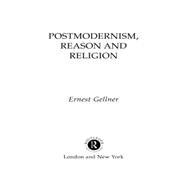Postmodernism, Reason and Religion
, by Gellner,Ernest- ISBN: 9780415080248 | 041508024X
- Cover: Nonspecific Binding
- Copyright: 8/20/1992
How can we account for the extraordinary strength of Islam in the modern world? Are the views of the Enlightenment still an acceptable basis for social order? InPostmodernism, Reason and Religion, Ernest Gellner suggests that we face three ideological options at the present time: a return to the genuine and firm faith of religious tradition; the pursuit of a form of relativism which abandons the notion of truth and resigns itself to treating truth as relative to the society or culture in question, and upholding the view that while perhaps there is a unique truth, no one society can fully possess it. The first option is especially strong in Muslim societies, and the book explores the reason why. Gellner finds the explanation in the relationship between high culture and low culture within Islam, where the high culture, previously the achievement of the minority, has now become the pervasive culture of the entire society. This high culture within Muslim societies performsa function similar to those performed by nationalism elsewhere. The second option is more fully developed in postmodernism in the West. The author is highly critical of this movement, arguing that postmodernism indulges in a kind of subjectivism as a form of expiation for the sins of colonialism. He maintains that the objectivity pursued as an ideal by social science during the colonial period was in fact a tool of domination, and that a subjectivist relativism is a way of moving beyond that mode. The book explores the strengths and weaknesses of the third option. He proposes that this option only works on assumption of inner compromise, and a separation of truth taken seriously as opposed to truth used as cultural decoration. This shrewd and penetrating book, written by one of the world's most highly respected social thinkers, digs into the heart fo the controversy between Islam and the West. It is a superb source of stimulating ideas and sound judgement that will be of particularinterest to students of sociology, anthropology, philosophy and Islamic studies.







